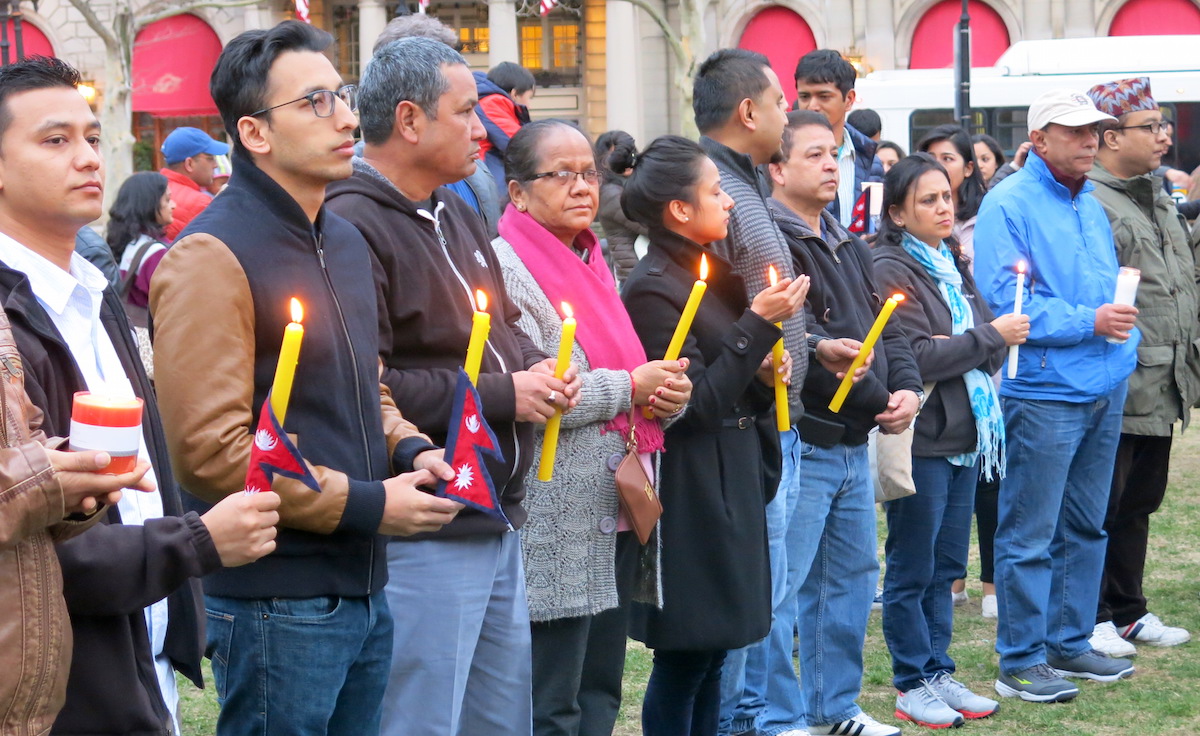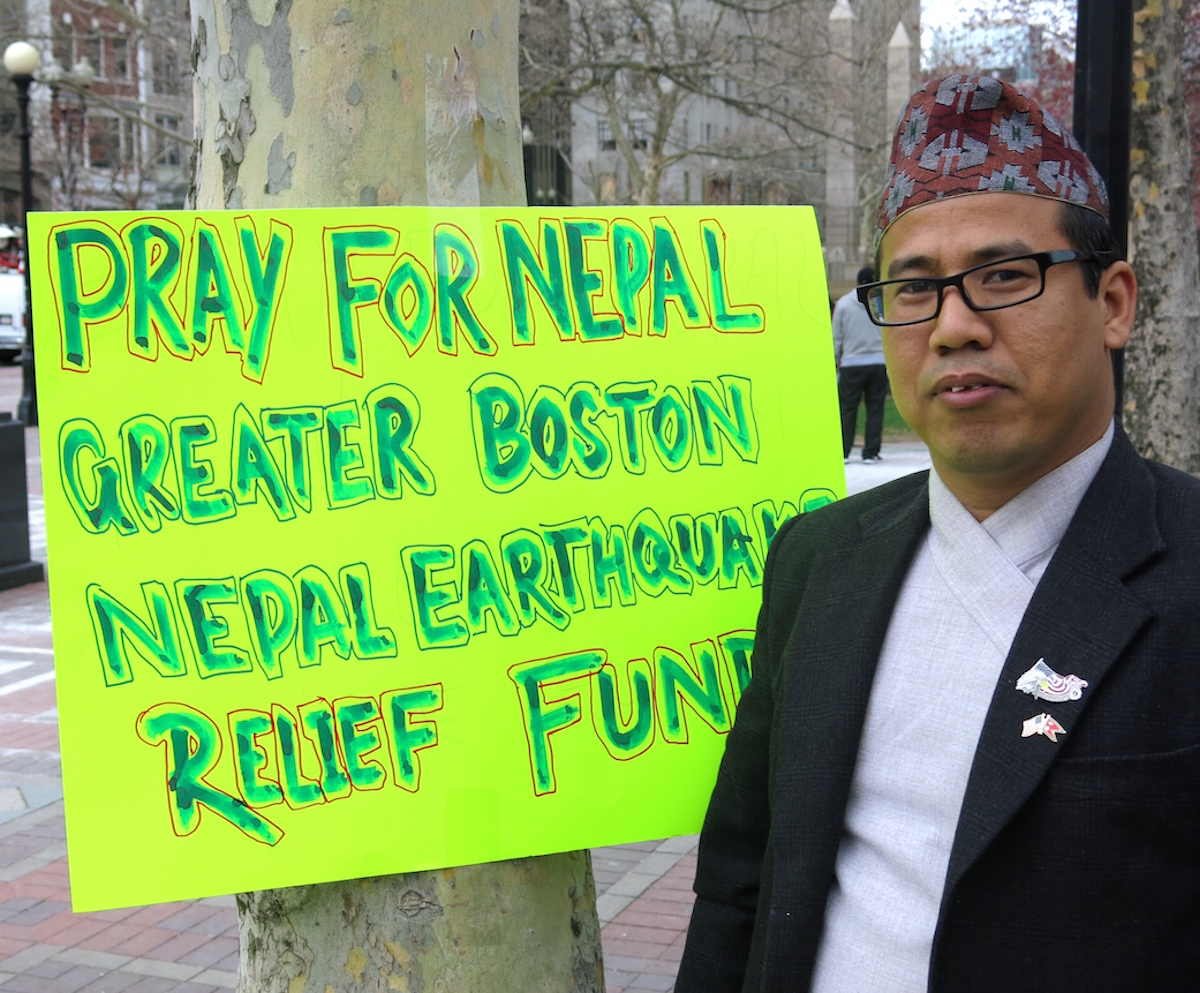Boston Pulls Together to Support Nepal Earthquake Relief Efforts

A crowd gathers at a vigil in Copley Square to remember the victims of the earthquake in Nepal. / Photo by Chris Sweeney
A recording of a Nepali crooner poured through a set of speakers at Copley Square on Sunday night as several hundred people gathered to reflect on the destruction wrought by the magnitude 7.8 earthquake that struck the southeast Asian country this weekend. Minutes before 7 p.m., the music cut off and dozens of members from Boston’s Nepalese community squatted down to ignite a display of tealight candles arranged in the shape of a heart and the word “Nepal.”
“We are trying to do something for our motherland,” said Milan Kumar Karki, who manages a Tedeschi in Everett. Karki came to the vigil with several neon green signs, including one that read “NEPAL STRONG – Greater Boston Nepali Community.”
Karki spent much of the weekend trying to get in touch with his wife and other family members who still live in Nepal. After several hours of angst and dead ends, a few messages popped up on his Facebook account letting him know that his loved ones were safe. Now he’s focused on pulling together Boston and getting us to respond to the unfolding crisis in his homeland.

Milan Kumar Karki came to Boston from Nepal about six years ago. / Photo Chris Sweeney
Throughout the city, small teams are mobilizing and reacting to the earthquake however they can. Beth Israel Deaconess Medical Center is slated to deploy a disaster medicine team on Wednesday or Thursday, according to Michael VanRooyen, director of the Harvard Humanitarian Initiative, which has worked with Beth Israel on training for these scenarios for years. VanRooyen told Boston that the Beth Israel team will head to a hospital in Kavre, Nepal, one of the hardest hit areas of the country, located about 30 kilometers outside of Kathmandu.
Meanwhile, VanRooyen and his team are also working with several United Nations agencies to identify medical needs, get real-time data collection systems up and running, and recruit and deploy necessary personnel. “We think there are more casualties and greater damage than what’s been reported,” he said.
VanRooyen would know. Just 18 months ago, he delivered several lectures on earthquake preparedness while visiting Nepal. He noted that the “rapid urbanization” of Kathmandu—driven in part by political tensions—and the rugged geography of the country pose significant challenges for international agencies and humanitarian groups that are scrambling to get on the ground and support the local response.
“After the first 48 to 72 hours, the likelihood of meaningful search and rescue is greatly diminished,” VanRooyen said. “Unfortunately, that window will have passed by the time that a lot of these groups are able to get there and set up.”
As the response shifts toward stabilization—delivering medical care, finding shelter for those in need, establishing access to food and water—VanRooyen worries that the country’s limited surgical capacity will be quickly overwhelmed. Intermittent electricity, dated and dilapidated healthcare infrastructure, and strained supply chains, all challenges that existed well before the earthquake, further complicate the response.
Making matters worse is that mountain climbing season recently got under way, putting a fair number of tourists and Sherpas on trails that have been bowled over by avalanches triggered by the earthquake and its aftershocks.
To that end, a company called Global Rescue, based downtown on Milk Street, has several employees already on the ground in Nepal assisting with search and rescue efforts. The company is a private firm that specializes in extracting expats from disaster zones. It had 100 paying members in Nepal when the earthquake hit. As of Sunday afternoon, it had made contact with 50 of these members, 40 of whom are on climbing or hiking expeditions, according to CEO Dan Richards.
Richards said his company is well positioned to lend its expertise to the response. Every year it supports upwards of three-dozen evacuations from the Himalayan Mountains, and it recently added in-country staff to coincide with climbing season.
“A member of our medical team was immediately helping with triage up at Lukla,” Richards says, referring to a small airport in the foothills of Mount Everest. “Whenever we are not taking care of a member, we are helping to the best of our ability with the humanitarian relief efforts.”
Right now, Nepal needs all the help it can get. As of Monday morning, more than 3,600 people had died as result of the earthquake, and that number is poised to climb throughout the week. Thousands more are suffering serious injuries.
After the candles were lit, those who gathered in Copley shared a moment of silence for those who have lost so much.
“We have to unite,” Karki, the Tedeschi manager, said. “We have to try to help.”


